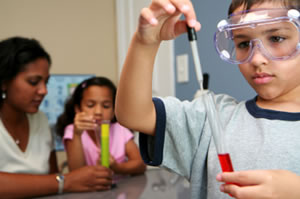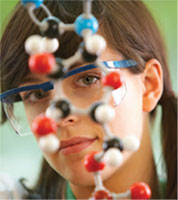Program Description

NIEHS science education projects enhance students' comprehension of and interest in environmental health sciences, and improve overall academic performance. These programs provide teachers with opportunities for professional development so that they can learn to use the curricular materials effectively in the classroom. Grantees have developed many innovative and engaging standards-based curricular materials.
What is NIEHS Doing?
Since 1993, NIEHS has fostered partnerships that focus on environmental health science education.
Community Engagement Cores
Community Engagement Cores (CECs) are part of several NIEHS programs, such as the Environmental Health Sciences Core Centers Program, Superfund Research Program, Children’s Environmental Health and Disease Prevention Research Centers, and the Breast Cancer and the Environment Research Program. These CECs translate the latest environmental health science research into tools and resources for a variety of audiences, including teachers and students. Grantees develop and disseminate a variety of educational materials for use in the classroom, at home, and in the community.
Highlights include:
- DNA/RNA Kits: Massachusetts Institute of Technology grantees developed DNA/RNA kits designed to teach students about DNA replication, mRNA transcription, DNA damage, DNA mutation, DNA repair, and more.
- Community Science and Water Sampling: University of Cincinnati grantees partnered with schools and teachers in eastern Ohio to provide students in grades 5-12 with the opportunity to participate in community science. Students received water testing kits to analyze samples from regional lakes, streams, wells, and tap water. Students can then provide valuable information to their peers, community members, and researchers regarding water quality.
- Farm and Food Kids Camp: University of Kentucky grantees hosted a farm and food kids camp in Eastern Kentucky to promote healthy eating and physical activity in Appalachian communities.
- Resources for Educators: University of Washington grantees developed curricula, classroom activities, and games for educators on topics such as the environment, genetics, nutrition, and personal choices.
- Environmental Health Curriculum in After-School Program: Texas A&M University grantees developed and implemented an environmental health curriculum for students at Houston's Furr High School for an after-school program called “Genius Time.” Grantees work with partners at Texas Sea Grant to provide instruction and facilitate hands-on learning activities on topics including the relationship between exposure to chemicals in plastic and puberty. Grantees also participate in students’ visits to campus and show them how their experiences can be leveraged for the college application process.
NIH Summer Research Experience Program

An essential element of the NIEHS Strategic Plan is to recruit and train the next generation of environmental health scientists who will further the understanding of the impact of environmental exposures on human health. NIEHS awards NIH Summer Research Experience (SRE) program grants to eligible universities and institutions of higher education to provide research experiences for high school and college students and for science teachers during the summer academic break. The NIH SRE Program is designed to attract talented high school students and undergraduates to research opportunities and careers in environmental health sciences.
Small Business Innovative Research and Small Business Technology Transfer Programs
Through the Small Business Innovation Research (SBIR) and Small Business Technology Transfer (STTR) programs, NIEHS supports small businesses in the development of innovative applications to translate and communicate environmental health research to improve public health. As part of these programs NIEHS encourages small businesses to work collaboratively with environmental health scientists to develop educational materials.
Highlights include:
- Science Take-Out Kits: University of Rochester grantees have developed Science Take-Out Kits for hands-on learning of environmental health topics. The activities do not require any special laboratory equipment and can be used in any educational setting.
- Learn more about the projects from the PEPH webinar featuring presentations on Science Take-out Kits for Hands-On Learning and GO3 Treks.
Supplements to Promote High School Student and Undergraduate Research Experiences
NIEHS offers an administrative supplement program to NIEHS-funded researchers with certain types of grant awards to support summer research experiences in the environmental health sciences for talented and gifted high school students and college undergraduates. By offering this introduction to environmental health science research to motivated students, NIEHS hopes to both increase the number and elevate the credentials of the pool of applicants to graduate programs in the environmental health sciences.
Program Lead



